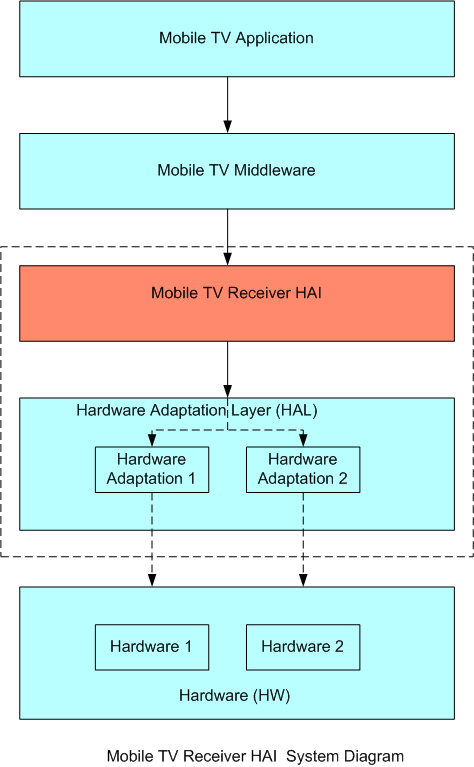Mobile TV DVB-H Receiver HAI Overview
Purpose
The Mobile TV DVB-H Receiver HAI (Hardware Adaptation Interface) is a component that abstracts DVB-H receiver hardware.
Required background
Mobile TV DVB-H Receiver HAI provides an programming interface between the receiver hardware and applications that use the data provided by that hardware.
DVB-H (Digital Video Broadcast-Handset) is the only mobile TV standard supported by the Symbian platform at the moment. This standard has been field tested in various locations between 2003 and 2007 and is already being rolled out as the content delivery platform for mobile TV in various regions. Full details are available from the DVB-H project web site.
Architectural relationship
Mobile TV Receiver HAI interacts with hardware through the Hardware Adaptation Layer (HAL) and abstracts hardware to mobile TV middleware. The diagramatic representation is shown below:
API summary
The Mobile TV DVB-H Receiver HAI component includes the following APIs:
DVB-H Receiver API
Used to access and control DVB-H receiver hardware. It provides scanning, tunning and data reception functionality.
For more information about DVB-H Receiver API, see DVB-H Receiver API overview.
DVB-H Receiver Information API
This API is use to retrieve information about DVB-H receiver and DVB-H broadcasts. This API does not have any control of DVB-H receiver hardware but only provide information.
For more information about DVB-H Receiver Information, see DVB-H Receiver Information API overview.
Typical uses
The Mobile TV DVB-H Receiver HAI component is used for the following:
Starting and stopping the broadcast receiver
To turn the receiver hardware on and off.
Retrieving information
To get information about the signal strength, state of the hardware and timing, amongst others.
Configuring IP filters
To allow the configuration and management of IP filters. IP filters are used to split the stream into its constituient parts.
Managing data reception
To allow the management of data reception.
Starting signal scanning
To initiate and control signal scanning on the hardware.
Selecting IP Platform
To select the IP platform used for tuning the hardware.
Copyright ©2010 Nokia Corporation and/or its subsidiary(-ies).
All rights
reserved. Unless otherwise stated, these materials are provided under the terms of the Eclipse Public License
v1.0.
